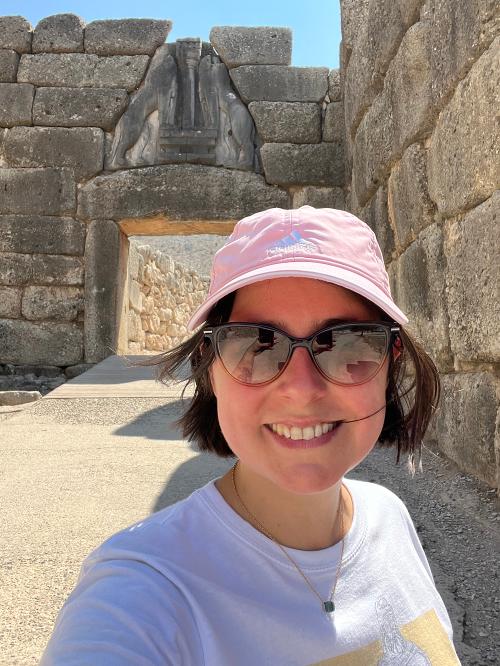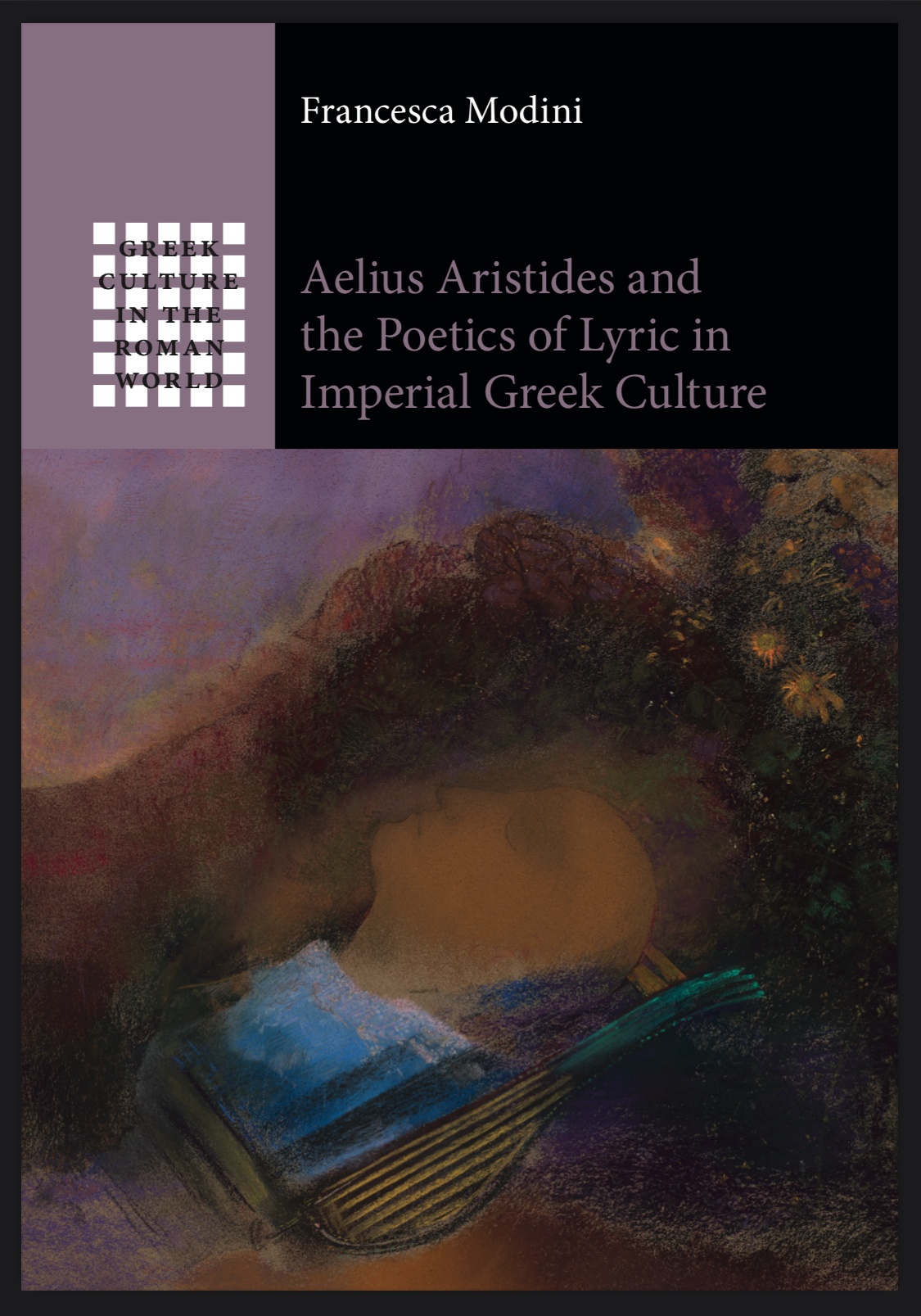Dr. Francesca Modini
Teaching Fellow in Greek Language and Literature
Tel: +44 (0)2476 528493
Email: francesca dot modini at warwick dot ac dot uk
FAB 2.09
Faculty of Arts Building, University Road
University of Warwick
Coventry CV4 7AL
About
Francesca Modini joined the Classics and Ancient History department at Warwick in 2021 to work on her postdoctoral project (‘Soundtracks of Identity: The Politics of Music in Roman Greece’), jointly funded by the University of Warwick and the Leverhulme Trust. She is currently a Teaching Fellow in the same department. She was previously Teaching Associate in Classics at the University of Bristol (2020). After her BA in Milan (2012), she studied for her MA at Scuola Normale Superiore in Pisa (2014) and then moved to London, where she got her PhD from King’s College (2019).Research
I am interested in ancient lyric poetry and musical culture, as well as in the multifaceted production of Greek writers from the imperial period all the way down to Late Antiquity. My doctoral research has encompassed the relationship between verse and prose, issues of cultural self-fashioning and construction of the past, and the impact of Roman imperialism on Greek identity performance. In my first monograph (forthcoming for CUP), I have combined these research strands to offer the first study of the reception and appropriation of archaic and classical poetry by authors of the so-called Second Sophistic. As a genre deeply involved in role-playing and the construction of literary personas, the use of lyric offered itself as a brilliant and sophisticated strategy of self-presentation for sophists, whose status depended on the public performance of Hellenism. Lyric tradition also mobilised political and social discourses (e.g. tyranny, oligarchic regimes, patronage) which took on new and problematic meanings under Rome.
During my postdoctoral fellowship, I have broaden my horizons to focus on the significance of music, and sound more generally, in the definition and representation of gender, social and ethnic identities under Rome. My new book project ('Soundscapes of Ancient Fiction: Gender, Diversity, Ecology and Sound in Imperial Novels') explores the role of sounds – not just music or ‘musicking’ but voices, noises and other sonic elements – in the construction of fictional worlds by imperial Greek and Latin novelists. My argument is that turning our attention to the ways in which these authors represent sonic phenomena and sonic agency throws new light on how they conceptualised the interactions a) between male and female; b) between different social and ethnic groups; and c) between human and non-human. This exploration will transform our understanding of both the ancient novel and the socio-cultural environment in which it developed and thrived. Investigating the sonic dimension of the novel, however, will also activate a new reception link with modern opera, whose narratives were often modelled on those of imperial fiction, and where gender agency and the representation of diversity are core to operatic soundscapes.
Selected publications
Books
-
Aelius Aristides and the Poetics of Lyric in Imperial Greek Culture. Monograph for the series ‘Greek Culture in the Roman World,’ Cambridge: Cambridge University Press. Link here.Link opens in a new window
-
Music and Power in Imperial and Late Antique Literature. EdiIn preparation for ‘Trends in Classics’, De Gruyter.
Journal Articles
- (In preparation) ‘The Greece of old is no more: Aristides’ lyric lament over Eleusis’.
- (2024) ‘Soundtracks of Milesian Identity: Timotheus and imperial musicians from Miletus’. Greek and Roman Musical Studies. Link here [Open Access]Link opens in a new window
- (2022) ‘Lyric in the Second Degree: Archaic and Early Classical Poetry in Himerius of Athens.’ CQ. Link here. [Open Access]Link opens in a new window
- (2019) ‘The Cyclops’ Revenge: Aelius Aristides on Plato, Philoxenus, and New Music,’ Greek and Roman Musical Studies 7.1. 51–69. Link here.
- (2018) ‘Fragments of War: Pindar’s Fragmentary Poetry between the Persian Wars and World War II,’ Literary Imagination 20.3. 283–97. Link here.
Book Chapters
- (Accepted and forthcoming) ‘Romancing festivals: festival sounds and other senses in the novels’, in E. Bakola, X. Buxton, E. Csapo and Z. Newby (eds.), The Experience of Ancient Festivals.
-
(2019) ‘Playing with Terpander & Co.: Lyric, Music, and Politics in Aelius Aristides’ To the Rhodians on Concord,’ in B. Currie and I. Rutherford (eds.), The Reception of Greek Lyric Poetry in the Ancient World: Transmission, Canonization and Paratext. Leiden: Brill. 417–38. Link here.
Blog posts
Teaching and supervision
- Greek 1Link opens in a new window
- Imperial Greek Literature (2022–2023, 2024–2025)Link opens in a new window
While maintaining an active research agenda, I'm passionate about teaching and committed to promoting Classics, especially ancient language learning, among students with diverse learning abilities and backgrounds. I'm always happy to be contacted by students who are interested in what I do or who might need extra help with their language learning. In 2022–2023, I was nominated for the Warwick Award for Teaching Excellence (WATE).
Outreach
I am an enthusiastic contributor to outreach projects and enjoy giving school and public talks. Please don't hesitate to get in touch!
Selected previous talks:
- The Edge of Glory: Pindar and the Meaning(s) of VictoryLink opens in a new window
- Sound of Power: Roman Emperors and MusicLink opens in a new window
- Party like it's 99AD: Music at Greek and Roman BanquetsLink opens in a new window
Qualifications
-
BA (Università degli Studi di Milano)
- MA (Scuola Normale Superiore & Università di Pisa)
- PhD (King’s College London)
Office hours
Wednesdays 1–2 pm
Thursdays 12–1 pm
Available on Teams by appointment.


